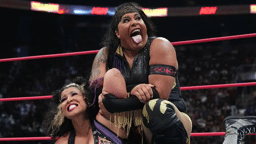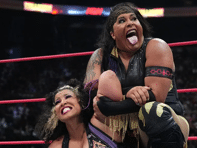“Black Wednesday” is a familiar phrase to pro wrestling fans. Frankly, any day preceded by “black” hits fits the bill. It signifies the day, typically post-WrestleMania, that WWE usually releases multiple wrestlers and on-screen talent in one of the more upsetting examples of spring cleaning. Fans haven’t had to use the term for the last few years as WWE adjusted to more of a talent hoarding strategy with releases coming far more infrequently.
That period came to an end Wednesday when WWE fired or furloughed more than 35 wrestlers, on-air talent, writers, coaches and other personnel. The decision comes six days after Florida Governor Ron DeSantis deemed WWE an essential business and two days after Orange County Mayor Jerry Demings referred to WWE as a “small family.”
The move cut especially deep, as it came just hours after WWE had announced cost-cutting measures citing adverse economic impact from the coronavirus pandemic. The company claimed in the same release it has “substantial financial resources” in the range of $500 million “to manage the challenges ahead.”
Many of those cut, including wrestlers Drake Maverick and Mike Kanellis, posted emotional charged responses following the announcement.
Get off the sidelines and into the game
Our weekly playbook is packed with everything from locker room chatter to pressing LGBTQ sports issues.
My immediate thoughts.@WWE @WWENXT #WWE #NXT @TripleH @ShawnMichaels #Cruiserweight pic.twitter.com/Afw58V7eo1
— Drake Maverick (@WWEMaverick) April 15, 2020
Wednesday was just the latest chapter in WWE’s often criticized handling of its business during the global health crisis. The company’s supposed stand off with the City of Tampa over WrestleMania 36 feels like a distant memory despite it being last month. But that was only where the story started.
Since early March, WWE has run headlong into outrage as it tried to push forward with business as usual. The company moved all programming, including WrestleMania 36, to its Performance Center in Orlando, Fla. and Full Sail University in Winter Park, Fla., and continued to record shows on a closed set despite social distancing guidelines outlined by the CDC.
Multiple matches at WrestleMania 36 were changed due to wrestlers getting sick or having underlying conditions that made them more susceptible to the coronavirus. The most notable example of the latter was WWE’s top full-time star Roman Reigns, who remains immunocompromised after battling leukemia for the second time just over a year ago, and he reportedly made the decision himself to not participate.
That mismanagement became more concerning when WWE revealed Saturday that a non-wrestler, on-screen talent tested positive for COVID-19 in March and had since fully recovered after a quarantine period.
The TV recordings themselves brought the ire of law enforcement as, according to Stephanie Coueignoux of Spectrum News 13, the Orange County Sheriff’s Department notified WWE that it was in violation of Florida’s “stay at home” order multiple times in March and early April. It is unknown why WWE’s recordings didn’t cease following those orders, but DeSantis’ decision to name WWE an essential business came just days after the last time they were ordered to shut down operations.

Exactly why DeSantis gave WWE the same status as hospitals and grocery stores remains vague, but some political connections between the State of Florida and McMahon’s wife, former WWE CEO and head of the Small Business Administration, Linda McMahon, raised eyebrows. On April 9, the same day that DeSantis named WWE an essential business, America First Action, a conservative Super-PAC headed by Linda McMahon, contributed $18.5 million to the State of Florida to support President Donald Trump’s reelection campaign in Orlando ($11.3 million) and Tampa ($7.2 million). Demings added to the speculation at a press conference Monday when he stated WWE was given essential status after “some conversation with the governor’s office regarding the governor’s order.”
DeSantis himself said he made the decision because people are “starved” for new entertainment.
McMahon announced the company would return to live broadcasts shortly after DeSantis’ order reportedly due to fear that the company might breach its lucrative contracts with Fox and NBCUniversal.
But Wednesday’s talent cuts and other planned cost-cutting measures call those fears into question. If WWE believes it must run live programming to maintain television rights deals, contracts that could help it top $1 billion in revenue in 2020, and DeSantis is allowing it to do, then why did WWE feel the need to enact such drastic financial cutbacks?
That question, along with many others regarding WWE’s path through the pandemic, remain unanswered, but one thing is for sure: much like UFC president Dana White, Vince McMahon isn’t fighting the correct fight. It’s fitting that White lumped himself together with McMahon in March as the only two figures trying their hardest to maintain normal business practices during these unique times.
The only difference between the two is that McMahon hasn’t been nearly as publicly vocal in his defiance throughout the past month. WWE didn’t even refer to the coronavirus by name on its programming until releasing a coronavirus PSA featuring WWE wrestlers on Monday. Even as multiple WWE wrestlers self-quarantined, the company continued to play ostrich in the public sphere.
During this time, we need to protect ourselves and others. You can do that by washing your hands and avoiding touching your eyes, nose and mouth. Learn more ways to stay safe and slow the spread at https://t.co/ZMamL4wyd0. #AloneTogether pic.twitter.com/K88GGjFhVn
— WWE Community (@WWECommunity) April 13, 2020
There are plenty of things to criticize WWE and Vince McMahon for as the world fights to limit the coronavirus’ impact, yet the company appears unnervingly comfortable to keep adding to the pile. Wednesday showcased that even more than the last month.
WWE, much like the Trump Administration, where Linda McMahon recently worked, seems disproportionately preoccupied with economic status as compared to the human beings who make it a worldwide success. WWE has shown an ability to shake controversies over the past 40 years, but this one might be the one that sticks.
Check out further discussion of WWE and the coronavirus with Fanbyte’s Colette Arrand on this week’s episode of Outsports’ LGBT In The Ring podcast. Download and listen on Apple Podcasts, Spotify, Google Podcasts and other podcast services.
























